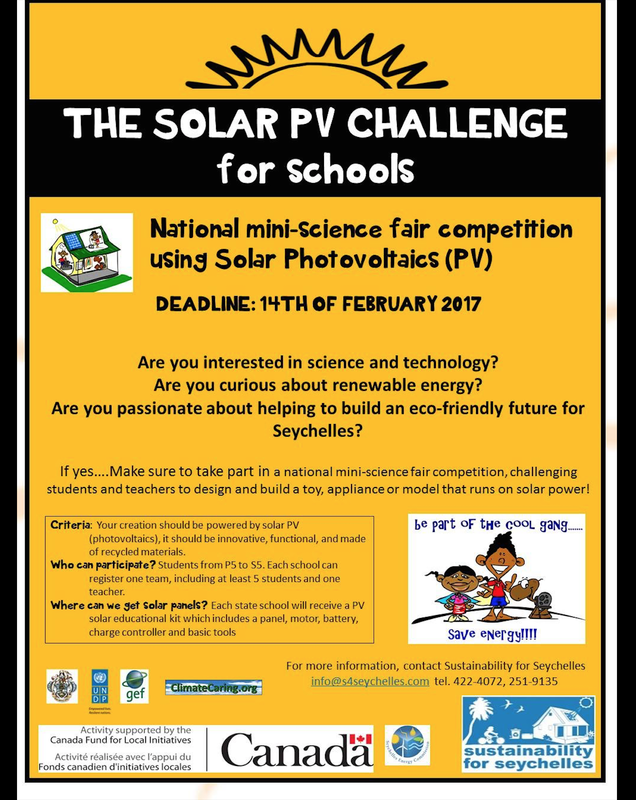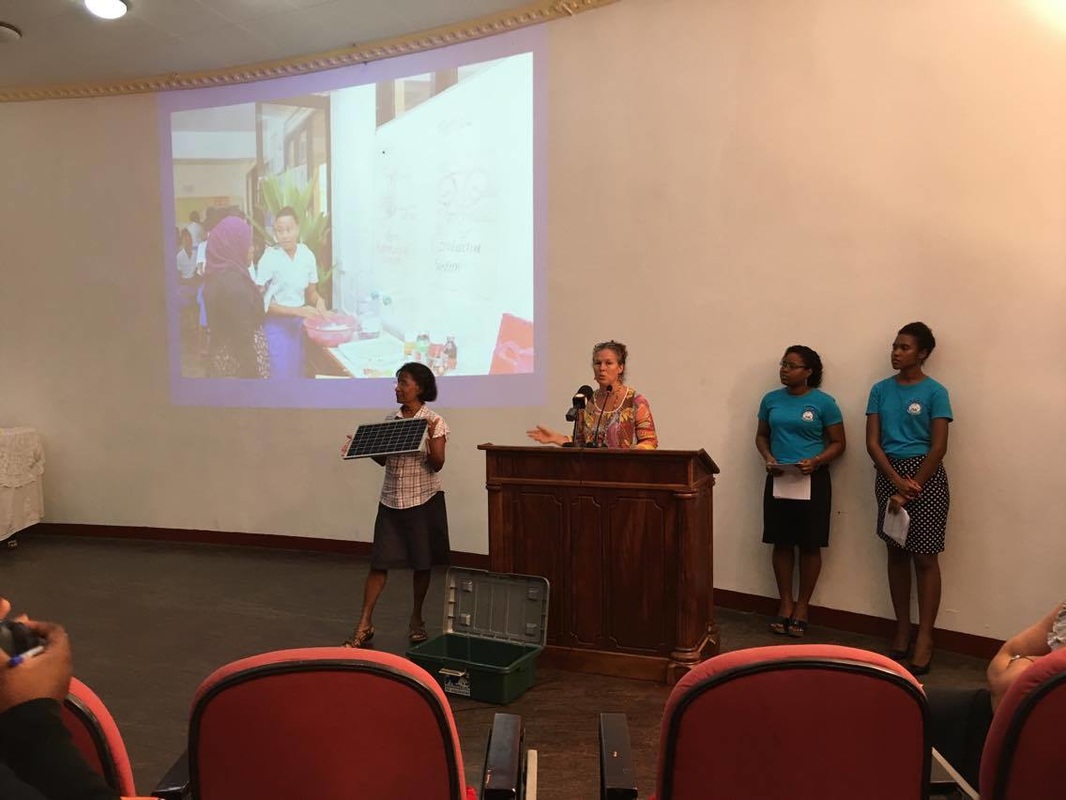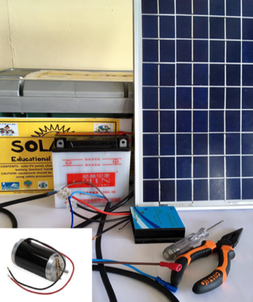Solar PV Kits for Schools
|
The Solar PV Challenge for Schools
The solar PV challenge for schools was one of the many activities organised by S4S in 2017 to promote the use of renewable energy. It was basically a mini science fair competition intended to stimulate use of the equipment in state' schools. For the competition, schools were invited to design and build a toy, model or other device that runs on electricity from solar PV kit. It was emphasized that all entries should be built using recycled / waste materials as much as possible. The competition was open to all schools in Seychelles (state and private), and suitable for students from P5- S5. Each school team included at least one teacher and five students.The team built their own project as part of the competition and the most innovative creations had the best changes of winning. Other requirements were that students should be able to explain how their creation works, why they decided to build it, any safety precautions they had to consider, and how it could be used more widely in society. Teams scoring the highest points were awarded prizes. Primary and secondary schools were judged separately. |
|
Climate Change and Renewable Energy
Workshop for Youth On Tuesday and Wednesday, December 13th and 14th 2016, secondary students mainly from Wildlife Clubs Seychelles participated in a 2-days training to learn more about climate change, renewable energy in particular solar Photovoltaic PV technology. The training was held at University of Seychelles and the field trip to SIT, and PUC. The youth workshop was attended by; 23 students and 2 teachers on day 1, and 21 students and 1 teacher on day 2. The workshop was organized by the NGO Sustainability for Seychelles (S4S) in collaboration with the Wildlife Clubs Seychelles. The training was facilitated by Michele Martin (Sustainability for Seychelles), Magdalena Górska (Intern from Avans University, S4S) and Gino Leon (S4S) with support from Terence Vel (Wildlife Clubs Seychelles), Elke Talma (UNDP/GEF Project Coordination Unit of the Ministry of Environment) and PUC. |
| ||
|
School Visits
School visits were a crucial component of the CFLI funded project Enhancing renewable energy education in Seychelles’ schools project in order to monitor and evaluate the results and interest at school level. During the month of November, 2017, after the teacher workshop to introduce the project, the S4S intern, Magdalena Górska went to primary as well as secondary schools to check if the students were interested in hands-on lessons about solar PV. The visits were also intended to promote the solar PV challenge competition and stimulate the use of the solar PV kits in schools. All teachers who participated in the workshop were contacted and asked if they wanted a school visit. Only a few schools responded due to the busy time of year preparing for exams and the end of the school year. S4S contacted some teachers directly to book a visit with students and teachers during lunch time or lesson time. During school visit Magdalena gave short lessons about renewable energy and in particular solar PV energy. She taught students how to connect a solar PV kit and how to use it. Moreover, students together with a teacher and Magdalena brainstormed ideas for the project, which they could create for the competition. |
| ||
|
Teachers' Workshop
On Monday, October 31st, 2016, teachers from primary and secondary schools in Seychelles participated in a workshop to learn more about solar photovoltaic (PV) technology and how to apply it in the classroom. The training was held at the Seychelles Institute of Teacher Education (SITE). The teachers’ workshop was attended by 35 teachers, both primary and secondary. The teachers in attendance specialised in science, technology, and the environment. The workshop was organised by the NGO Sustainability for Seychelles (S4S) in collaboration with the Ministry of Education. The training was facilitated by Michele Martin (Sustainability for Seychelles) and Magdalena Górska(Intern from Avans University, S4S) with support from Elke Talma (UNDP/GEF Project Coordination Unit of the Ministry of Environment), Tim Kirkpatrick (Climate Caring, a local PV supplier company), Shane Emilie (Ministry of Education) and Cynthia Alexander (Energy and Climate Change, the Seychelles Energy Commission). Many thanks to all of the participation for their time and involvement in the training. |
| ||||||
|
In September 2016, Sustainability for Seychelles (S4S) officially started this project to promote hands-on lessons in solar PV in Seychelles’ schools, as a support to the national science curriculum. Under the project, each state primary and secondary school will receive a donation of an educational kit for teaching and learning about solar PV in science & technology lessons. The kit includes basic equipment such as a small solar PV panel, a charge controller, battery, motor, necessary wiring, and tools. This project is being financially supported by a grant of CAD$25,000 from the Canadian Found for Local Initiatives (CFLI).
The aim of this project is to stimulate curiosity in, experimentation with solar PV and other Renewable Energy Technologies in Seychelles’ state schools. The main target group is students from P5 to S5 and the science and technology teachers. Furthermore, the project will support a reduction in Seychelles’ current reliance on fossil fuels and relatively high per capita carbon emissions. S4S has launched a solar PV challenge as a mini science fair competition intended to stimulate the use of the equipment in state schools. For the competition, schools are invited to design and build a toy, model or other devices that run on electricity from solar PV kit. All entries should be constructed using recycled/waste materials as much as possible The competition is open to all schools in Seychelles (state and private), and suitable for students from P5- S5. Each school team should include at least one teacher and five students. The team must build their project as part of the competition – the most innovative creations have the best chance of winning. The students should be able to explain how their creation works, why they decided to build it, any safety precautions they had to consider, and how it could be used more widely in society. The project will be completed at the end of February 2017 with the final activity being the prize giving for the competition entries. However, the project will carry on for longer since the use of the kits will be promoted on an ongoing basis through the Eco-Schools program of the Ministry of Education, the National Science Fair, and the science curriculum itself. |



